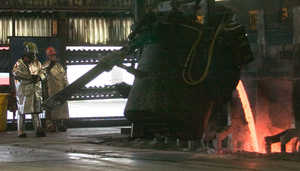forum
library
tutorial
contact

Intalco Ramps Up Production
by John StarkBellingham Herald, February 6, 2006
|
the film forum library tutorial contact |

|
Intalco Ramps Up Productionby John StarkBellingham Herald, February 6, 2006 |
Restart of second aluminum potline doubles capacity
 With a flurry of sparks and a splash of fiery orange molten ore, Alcoa Intalco Works employees started smelting aluminum Monday from a potline that has been idle for nearly four years.
With a flurry of sparks and a splash of fiery orange molten ore, Alcoa Intalco Works employees started smelting aluminum Monday from a potline that has been idle for nearly four years.
Restarting the potline means adding about 175 high-wage jobs, bringing the workforce at the smelter west of Ferndale to about 575. It also means doubling the plant's capacity from its current levels. Once the restart process is completed in the days ahead, the smelter will be operating two of its three potlines.
Mike Rousseau, plant manager, said Monday's restart came after four months of preparations that began last fall when Alcoa announced that it had secured enough power at favorable rates to restart the line, consisting of 240 pots that use massive amounts of electrical current to separate pure aluminum metal from ore.
To restart the first of the 240 pots, workers used an overhead crane to maneuver a 4,000-pound ladle full of a molten ore mixture into position. With the press of a button, the ladle tipped like a giant teakettle, and ore poured into the pot. In about five days, the pot will accumulate enough pure molten aluminum to be extracted and molded into bars and billets that serve as raw material for aluminum products factories around the world.
A cluster of about 30 workers came just to watch the restart, some wearing the orange hard hats of veteran workers, others with green hats marking them as new hires. Rousseau noted that green hats have been few and far between until recently, as the company scaled back employment and production.
The watching workers' reaction to the milestone was muted -- a few handshakes, a few thumbs-ups, but no whoops or high-fives. That may be because the job of restarting the 240-unit potline is just beginning.
"Congratulations, Mike," said James Sires, International Association of Machinists and Aerospace Workers local president, as he shook Rousseau's hand. "Two hundred and thirty-nine more to go."
Despite the hard work ahead, Intalco's newer workers say they are thrilled to be a part of it.
Not long ago, Dawn Parsons, 46, was working in the business office at Western Washington University. Now, for the first time in her life, she's working with giant cranes, molten metal and electricity by the megawatt.
"Lots and lots of people have been putting in lots of time and effort," she said. "It's incredible."
Julia Orloff-Duffey, 35, left her job as a supermarket meat wrapper to follow the footsteps of her late father, a 37-year Intalco employee, and her brother Jon, who has worked at Intalco for the past 12 years. She has many happy memories of company picnics and Easter egg hunts at Intalco's Totem Terrace recreation area.
Both women said they've been inspired by the many Intalco old-timers who came out of retirement to help train new workers.
"It makes it a lot easier," she said.
As recently as 2001, the Intalco smelter, owned by Pittsburgh-based aluminum giant Alcoa Inc., provided about 900 family-wage jobs.
But the West Coast energy crisis of that year cut off the smelter's lifeblood: the low-cost hydroelectric power that had been provided for decades by the federal Bonneville Power Administration. Intalco shut down for a year, and then resumed production in 2002 at reduced output and payroll. In 2003, the company cut production to one-third capacity, using just one of its three potlines.
Last year, Alcoa and BPA worked out a deal that gave the company a cash subsidy instead of a supply of BPA power, and the company used that subsidy to purchase power from a variety of sources to get two of the plant's three potlines running.
Rousseau said the BPA deal was just one of the factors that helped make the production expansion possible. Among the others were a package of tax relief measures passed by the state Legislature, a 2006 labor agreement, and a good price for aluminum on world markets.
Barring unforeseen calamities, Rousseau believes Intalco's jobs are likely secure for the next five years, until the current arrangement with BPA expires. After that, the company remains committed to getting a long-term power deal with BPA, but the company likely faces stiff competition from public utilities and other power users in the struggle over the region's limited low-cost power supply.
learn more on topics covered in the film
see the video
read the script
learn the songs
discussion forum
